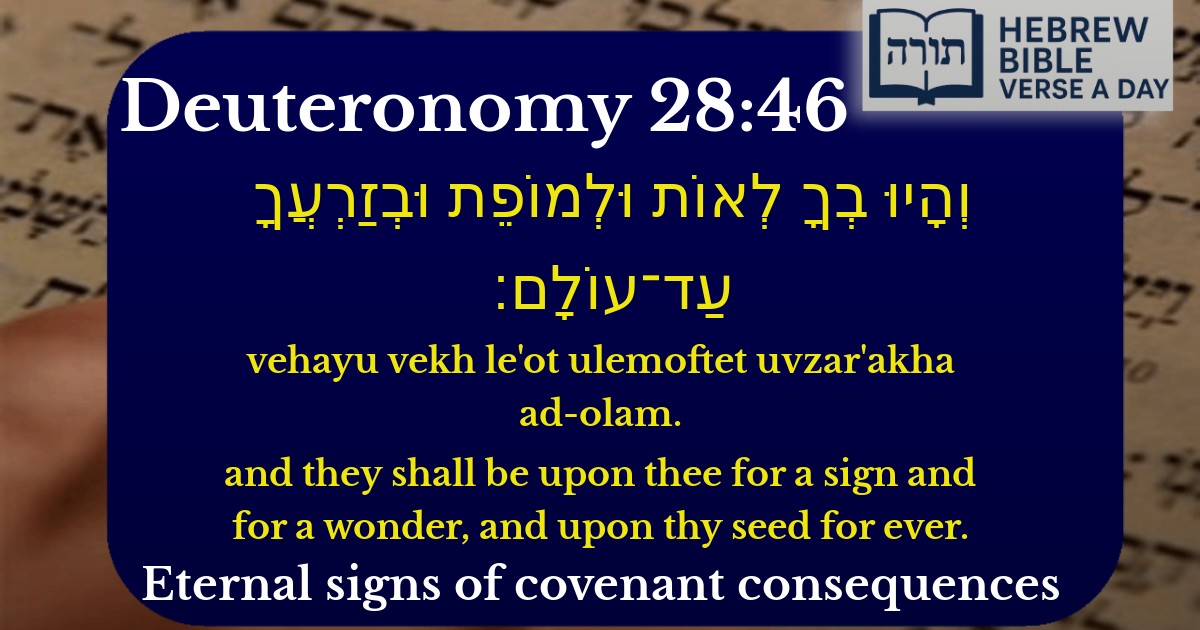Frequently Asked Questions
Q: What does 'they shall be upon thee for a sign and for a wonder' mean in Deuteronomy 28:46?
A: According to Rashi and other traditional Jewish commentators, this verse refers to the mitzvot (commandments) that the Jewish people observe. These mitzvot serve as a 'sign' and 'wonder' - meaning they distinguish the Jewish people and demonstrate their special relationship with Hashem. The observance of Torah and mitzvot makes the Jewish nation unique among the nations of the world.
Q: Why does the verse say these signs will be 'upon thy seed forever'?
A: The phrase 'upon thy seed forever' teaches us that the covenant between Hashem and the Jewish people is eternal, applying to all future generations. As Rambam explains in his writings, the Torah and its commandments were given for all time, and every Jewish soul that will ever exist is included in this eternal covenant.
Q: How do we see this verse's message about signs and wonders apply today?
A: Today we see this through Jewish practices like Shabbat, kosher, and tefillin which visibly distinguish observant Jews. The Talmud (Chagigah 3b) explains that even when Jews are scattered among the nations, these mitzvot serve as constant reminders of our special relationship with Hashem and our unique mission in the world.
Q: What's the connection between this verse and the Jewish people's special role?
A: The Midrash (Sifrei Devarim) explains that through faithfully observing mitzvot, the Jewish people become a 'light unto nations' - demonstrating devotion to Hashem. Our adherence to Torah serves both as a sign of our chosen status and as an inspiration to others about proper service of the Creator.
Q: Does this verse have any connection to tefillin or mezuzah?
A: Yes, Rashi connects this concept specifically to mitzvot like tefillin and mezuzah which are literally 'signs' upon our bodies and homes. The Talmud (Menachot 43b) states that these physical mitzvot serve as constant reminders of our connection to Hashem and our commitment to Torah, fulfilling the idea of being 'for a sign.'


Context of the Verse
The verse (Devarim 28:46) appears in the section of the Torah known as the "Tochacha" (Rebuke), where Moshe warns Bnei Yisrael of the consequences of failing to observe the mitzvos. The phrase "וְהָיוּ בְךָ לְאוֹת וּלְמוֹפֵת" ("they shall be upon thee for a sign and for a wonder") refers to the punishments and exiles that will befall the Jewish people if they stray from Torah observance.
Rashi's Explanation
Rashi explains that the "sign" and "wonder" refer to the suffering and exile that will serve as a testimony to the truth of the Torah's warnings. He cites the example of the destruction of the Beis HaMikdash and the subsequent exile, which stand as enduring reminders of the consequences of abandoning the mitzvos. The phrase "וּבְזַרְעֲךָ עַד־עוֹלָם" ("and upon thy seed for ever") indicates that these signs will persist throughout Jewish history, serving as a lesson for future generations.
Rambam's Perspective
In Hilchos Taaniyos (1:3), the Rambam teaches that the suffering and exile are not merely punishments but also serve as a means of awakening teshuvah (repentance). The "sign" and "wonder" are meant to inspire introspection and return to Hashem. The enduring nature of these signs ("עַד־עוֹלָם") underscores the eternal covenant between Hashem and Klal Yisrael, ensuring that even in exile, the Jewish people will ultimately return to Torah.
Midrashic Interpretation
The Midrash (Devarim Rabbah 4:4) elaborates that the "sign" and "wonder" also allude to the miraculous survival of the Jewish people despite persecution and exile. This survival itself is a testimony to Hashem's providence and the eternal nature of the Jewish people. The phrase "וּבְזַרְעֲךָ עַד־עוֹלָם" reinforces the idea that the Jewish people will never be completely destroyed, as promised in the Torah.
Key Themes